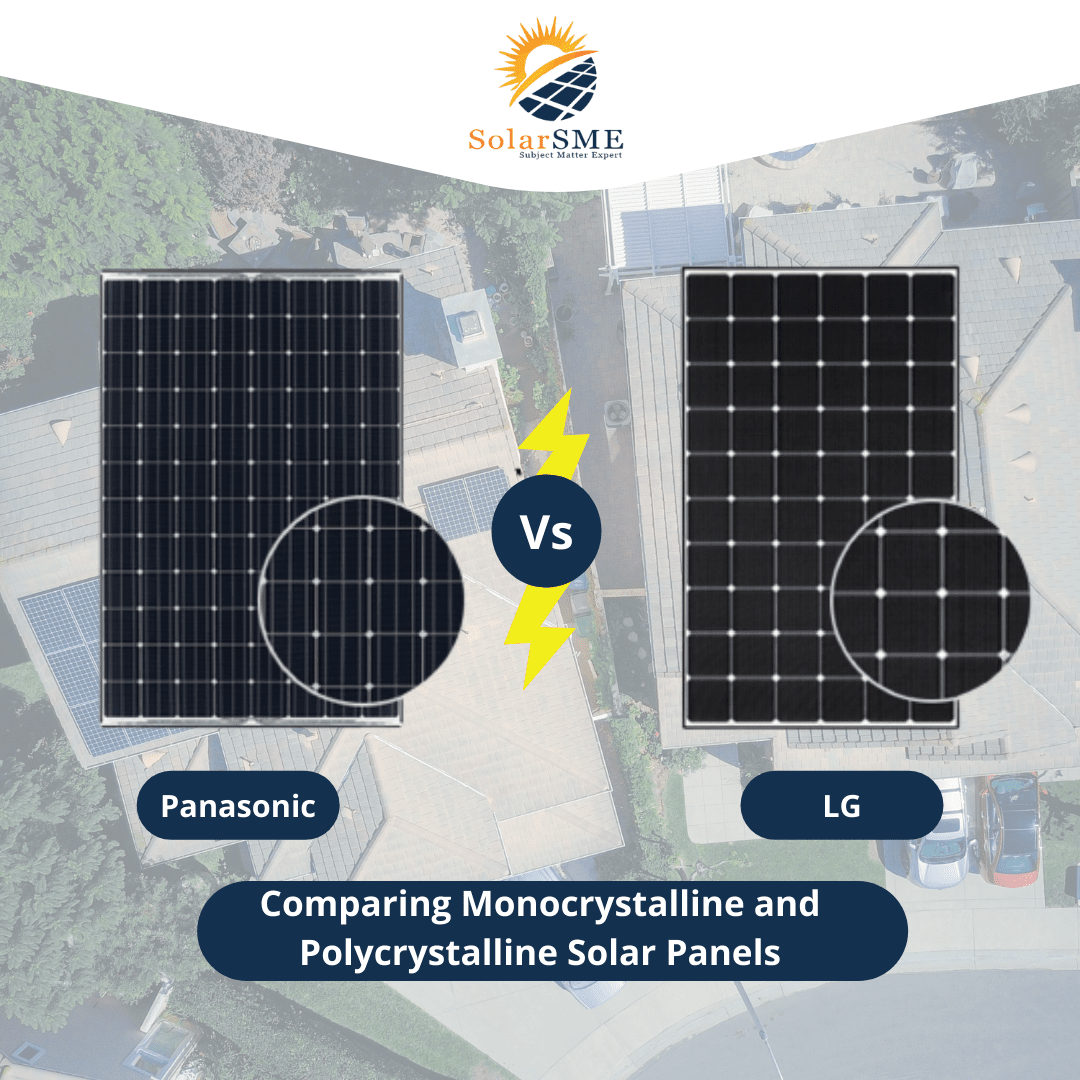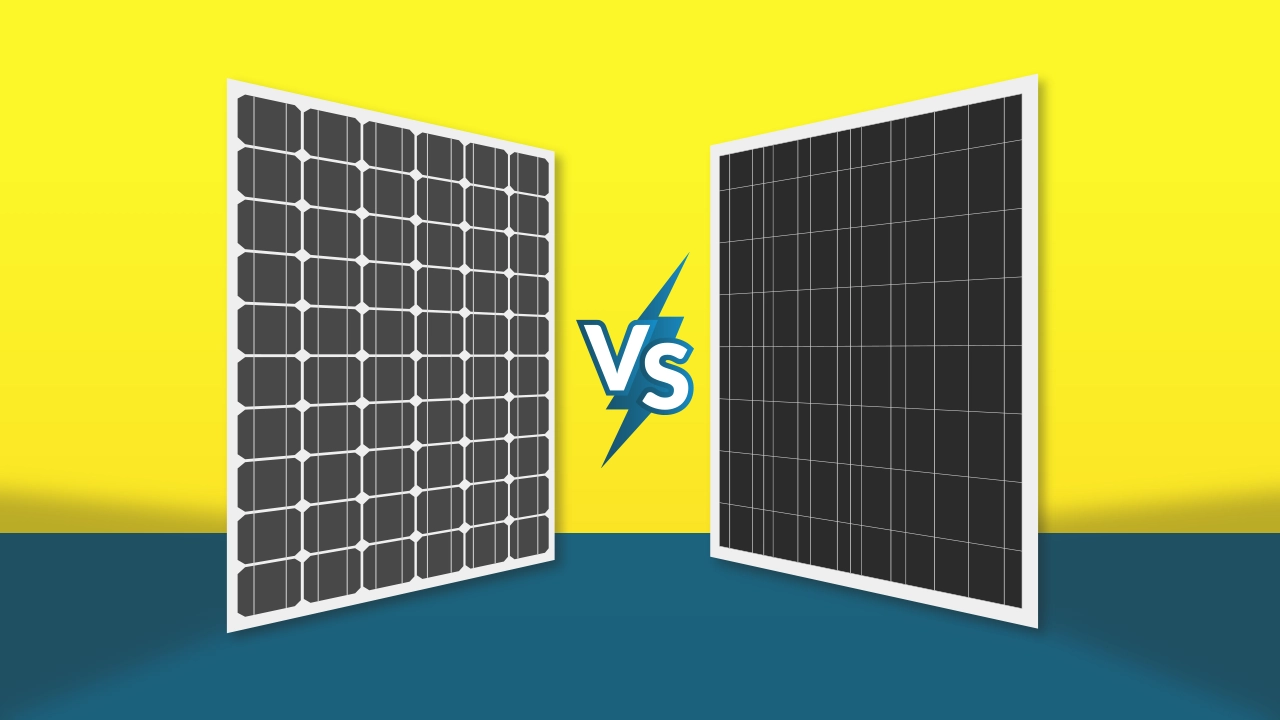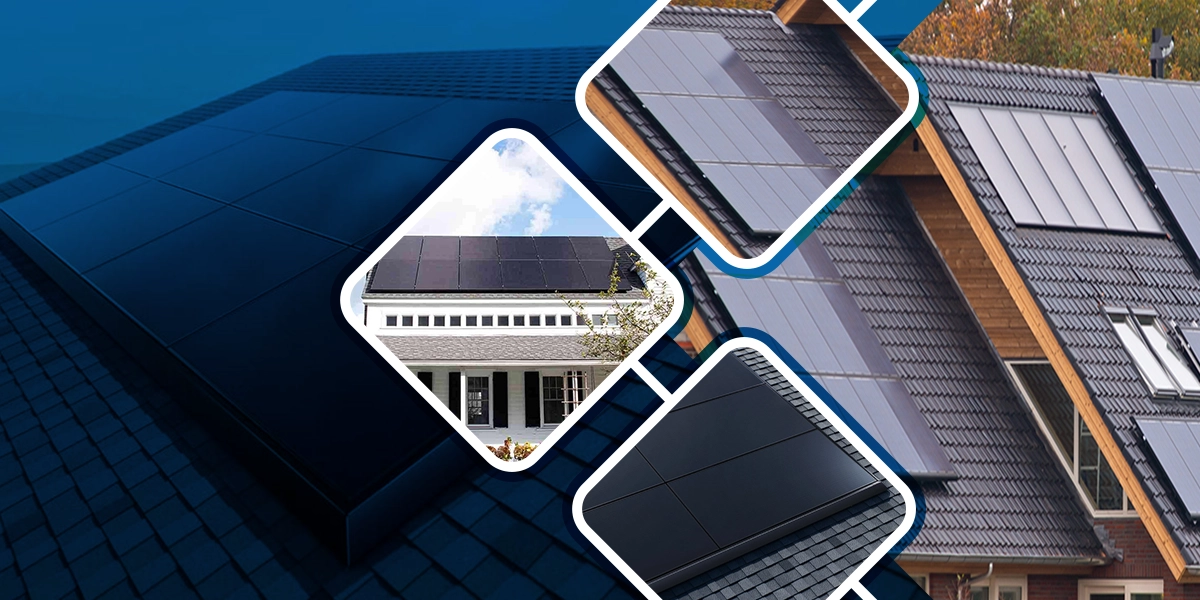- Updated On: March 27, 2025
Best Solar Panel Brands: Which One You Should Choose?
Solar is becoming popular as a primary power source due to the price drop of solar panels & backup solutions, 30% federal tax credits, and local rebates. Many homeowners and businesses are shifting to clean power to cut high energy costs and power independence during frequent outages. As it is a big investment, every investor wants to invest in the best solar panel brand to gain high returns in a shorter payback period. Also, as solar technology evolves, solar energy systems are becoming more efficient and affordable. There are hundreds of solar brands in the market offering competitive prices, making it a daunting task for homeowners to choose the top-rated solar panels according to home needs. However, if you go solar with a trusted solar installer, they will use high-quality panels and other equipment to ensure peak system performance.

Let’s explore some useful tips to choose the best solar panel system for your home for maximizing ROI and shorter payback period. Also, we will suggest some top solar brands for your assistance.
What factors should you consider before buying solar panels?
Before making a solar system purchase, it is important to carefully analyze some major factors. It will make sure your investment yields your savings worthwhile, Exploring these details will help you make a wise choice.
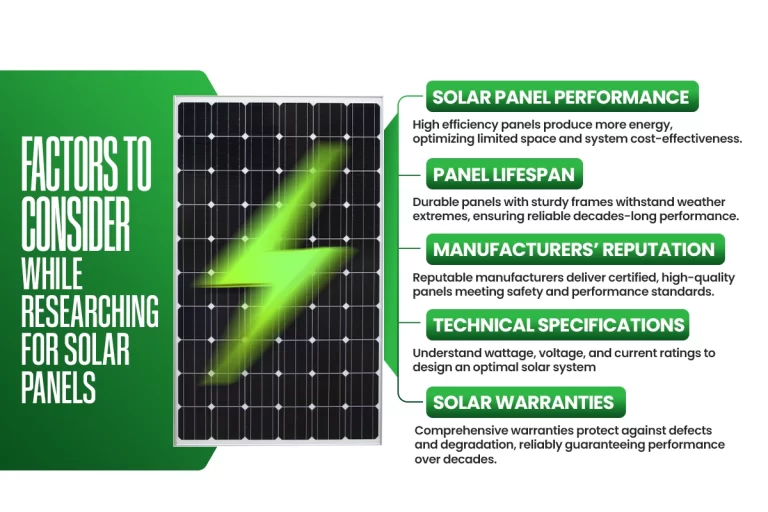
Solar Panel Performance:
The efficiency and expected overall performance of solar panels are vital considerations. Higher efficiency panels generate more electricity, making them suitable for limited space, like on a small roof or garage. However, they are often more expensive. Choosing the top-rated solar panels for your needs includes balancing the efficiency of the panels with their cost-effectiveness and your available space.
Panel Lifespan:
The durability of solar panels is essential for ensuring a long and reliable lifespan. The lifespan of a solar panel is based on the materials used and the manufacturing quality. Look for solar panels with sturdy frames and durable tempered glass that can withstand harsh weather and reduce potential physical damage.
Manufacturers’ Reputation:
Assessing the overall quality of solar panels includes considering the solar panel brand and the panel’s certifications. The best solar panel company commits to higher quality standards. Additionally, solar panels with certifications like IEC (International Electrotechnical Commission) and UL (Underwriters Laboratories) indicate that they meet specific safety and performance criteria.
Solar Panel Technical Specifications:
Understanding the technical specifications of solar panels reflects the wattage, voltage, and current flow. Wattage is the power output of a panel, while voltage and current impact the overall system design. A trusted local solar installer can assist you with all of these factors and can explain the benefits and cons of different wattage and voltage combinations.
Solar Warranties:
Solar panel warranties assure potential defects and performance issues. There are typically two types of warranties: product warranties and performance warranties. Product warranties cover manufacturing defects and generally range from 10 to 25 years. Whereas, Performance warranties guarantee a certain level of power output over a specified period, usually 25 to 30 years. Opt for panels with longer and leading warranties to ensure the longevity of your investment.
What are the best solar panels for your home?
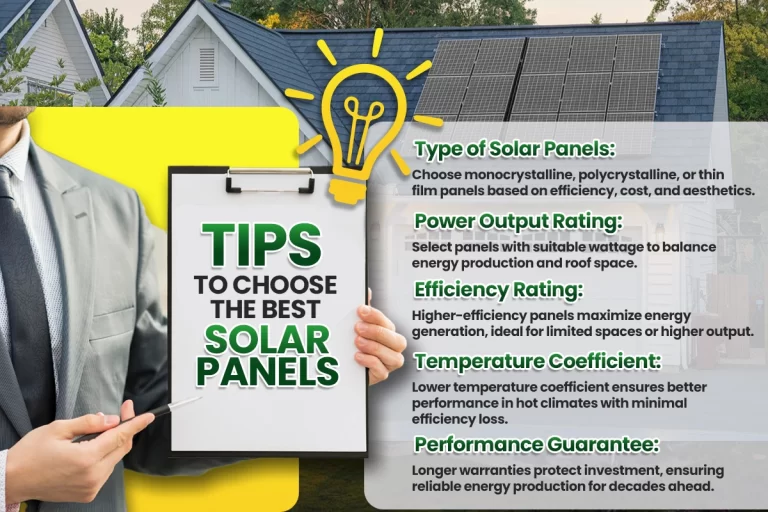
Type of Solar Panels:
There are three main types of solar panels available in the market: monocrystalline, polycrystalline, and thin-film. Monocrystalline panels are known for their high efficiency and sleek design. They are often more expensive but offer better performance in limited space. Polycrystalline panels are cost-effective but slightly less efficient. Thin-film panels are lightweight and flexible, making them suitable for specific applications, and are often a little less efficient than silicon solar panels but they’re also less expensive, making them ideal for larger installations.
TIP: Choose the type according to your space availability, budget, and aesthetic preferences.
Power Output Rating
The power output rating of a solar panel is measured in watts (W). It indicates how much electricity the panel can produce under standard test conditions. Higher-watt solar panels produce more electricity.
TIP: Choose a system that balances power output with available roof space. For a limited installation area, you may need to choose higher-wattage panels.
Efficiency Rating
Solar panel efficiency is a vital factor in determining how much energy a panel can produce. Higher efficiency percentages indicate better energy conversion performance. Monocrystalline panels generally are more efficient than polycrystalline ones.
TIP: Higher-efficiency panels are beneficial if you have limited space or want to maximize energy production from your installation.
Temperature Coefficient
The temperature coefficient measures how much a solar panel’s efficiency decreases as temperatures rise. Solar panels are more efficient in cooler temperatures, and a lower temperature coefficient indicates better performance in high temperatures.
TIP: When choosing solar panels, consider the average temperatures in your location to ensure the panels can maintain efficiency during hot weather conditions.
Which are the best solar panel brands in 2025?
Panasonic:
Panasonic is a familiar name with a long history of delivering high-value electronics, including solar panels. Besides their powerful performance, these panels include outstanding warranties, providing an extra layer of assurance. The reliability of a well-established company like Panasonic further instills confidence that the warranties will be upheld. Below are the best Panasonic panels details:

LG:
With a 25-year product and power warranty and a guaranteed power output of over 90% after 25 years, LG has been a consistent market leader in solar panel efficiency. The LG NeON® R series panels are recognized as highly efficient in the market. Also, all LG PV modules use monocrystalline solar cells, which provide excellent module efficiency and power output. As LG is a reputable brand, you can expect their warranties to be upheld for a long time.

Tesla:
Tesla markets itself as the “cheapest solar panels” manufacturer in the market. Both Tesla solar panels series including the S Series and the H Series, come in a black finish and use solar technology that hides the edges and removes obvious grid lines to give the impression that the system is better integrated into your roof. Tesla solar panels are advantageous for those concerned about aesthetics and who want to go solar at a lower cost.

Qcells:
Qcells has now become one of the leading manufacturers of solar panels worldwide. Qcell solar panels are a good choice for people who value efficiency. It often offers similar technologies at a cheaper cost per watt. Qcell panels aren’t the most affordable, but over time, the cost savings may exceed the initial investment. Qcells currently offers three lines of best residential solar panels:

Mission Solar:
Mission Solar is a U.S.-based solar panel manufacturer. For businesses and homeowners looking for affordable panels for their solar installation, Mission Solar panels are a good investment. The company’s standard-wattage products offer a suitable choice for commercial installation. Additionally, the company sells panels with above-average efficiency, however, they may be more expensive. Mission solar panels are among the best commercial solar panels. Additionally, the company provides industry-standard panel warranties.
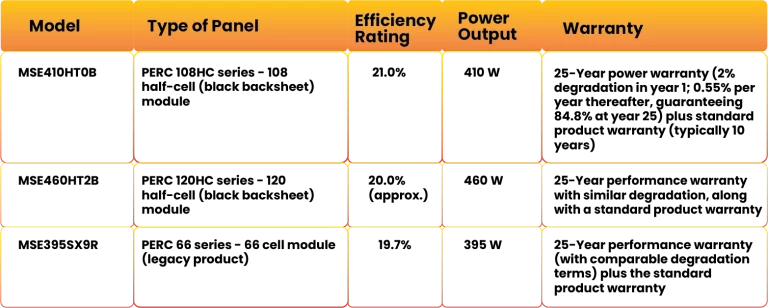
Maxeon Solar:
Maxeon panels outshine the average solar panel with up to 22.8% efficiency ratings. These high-efficiency solar panels not only absorb more sunlight but also boast top-tier specifications across the board, from temperature coefficient to warranty terms. However, they ranked as the second most expensive solar panels.

Canadian Solar:
Recognized as one of the top 5 solar panel manufacturers globally, Canadian solar panels are rated as top homeowner’s choice solar brand. The brand offers two main residential solar panel series: the HiKu and HiDM. These series provide homeowners with a balanced selection, offering both top-tier performance and cost-effective options to suit different needs and budgets.

REC:
REC is a solar company renowned for its diverse range of solar products. The latest addition to their lineup, the Alpha Pure-R series, stands out with an impressive temperature coefficient and is particularly well-suited for regions with consistently high temperatures. The combination of advanced technology and compatibility makes REC panels an excellent choice for those seeking optimal performance in warmer climates while maintaining an appealing roof asthetics. Below are the best REC options:

Trina Solar:
Trina solar panels are an excellent choice if you want to achieve a balance between cost and performance. To maintain competitive prices, Trina Solar uses advanced solar technologies, such as PERC, bifacial, and half-cut. Trina uses monocrystalline solar cells for its residential solutions. The best PV modules of Trina Solar include:

Jinko Solar:
Jinko Solar has the title of the world’s largest solar panel manufacturer, recognized for producing reliable and cost-efficient solutions for residential and commercial applications. The company offers a diverse range of requirements of solar panels suitable for residential, commercial, and utility-scale projects. Jinko solar panels are considered as a go-to for accessible, budget-friendly solar solutions.

Solaria:
Solaria solar panels are popular due to three factors: quality, performance, and design. It sells two lines of high-efficiency solar panels: the PowerXT Premium Series and the PowerX Performance series. All of Solaria solar panels are designed using the company’s patented shingled solar cell technology to maximize the number of solar cells in the panel. This not only lets them generate more power, but it makes them more durable against wind, snow, and rain.

How to choose the best solar panels according to region and climate?
The climate and region in which you live will impact solar panel efficiency. Dust and filth, temperature, latitude, shading, irradiance, and panel orientation all affect the power production. We have classified the best solar brands according to climate like:
For Shady & Rainy Climates:
If you want to install the best panels for your home but live in a region that often has rain, snow, or other gloomy conditions, go with high-output and high-efficiency panels like Panasonic, LG, & Mission Solar.
For Warm & Dry Climates:
Do you reside in an area with lots of heat and sunshine? You’re in a great location for high-end solar panel effectiveness. In this situation, you may also use the temperature coefficient as a guiding principle when making decisions. With a remarkable -0.24 temperature coefficient and a 25-year warranty, REC, Qcells, or Trina Solar are great in such areas.
Why should you invest in quality solar panels and accessories?
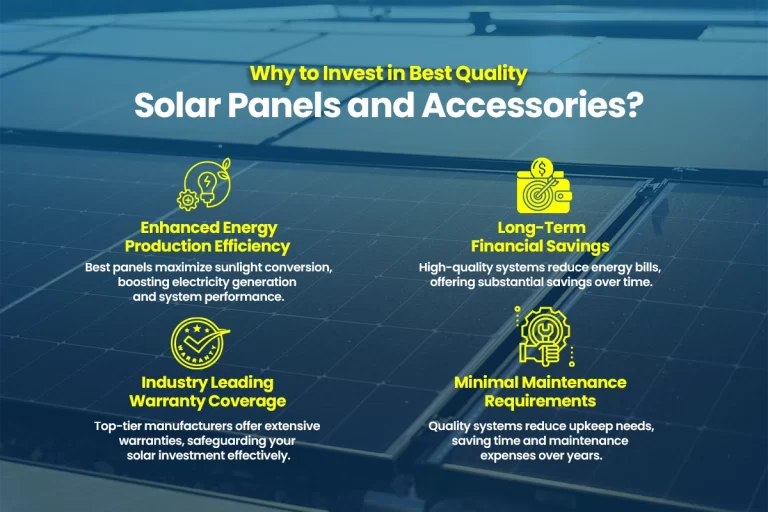
As a trusted local installer, Solar SME recommends investing in the best solar brands that offer a variety of choices in terms of wattage and sizes. Evaluate panels for their warranties and efficiencies to ensure they meet your needs. Make sure your selection will work best for the climate in your area. A certified solar company can assist you with the best solar solutions for your needs. You can get a FREE Quote or book a consultation with Solar SME, Inc. for expert advice and affordable solutions with flexible financing options.
Related Articles:
LG & Panasonic, both market leaders are the best solar panel brands in the solar energy industry. The two competitors are globally recognized as sellers of high-efficiency and top-quality best solar panels for your home.
When looking for solar panels for your photovoltaic (PV) system, you’ll come across two basic choices: polycrystalline vs. Monocrystalline solar panels.
If you are searching for a budget-friendly and sleek rooftop energy system, Tesla solar panels are a good option. However, their efficiency rating is within the average range. So, if you live in a sunny state, you can choose them for aesthetics and cost-effectiveness. Explore the specifications and costs of Tesla solar panels. Also, we will compare them with other brands to help you decide about these panels.

